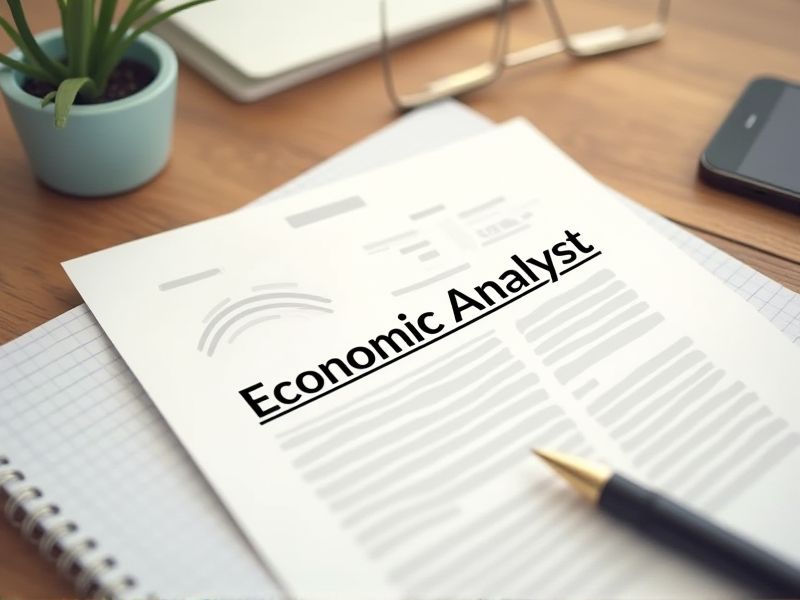
Economic analysts interpret complex data sets to guide decision-making in various financial sectors. Certain certifications in the field validate knowledge and skills, enhancing credibility and competitive edge. Certifications ensure analysts stay updated with current economic trends, methodologies, and regulatory standards. Key certifications you may need for an Economic Analyst role include: [list of certifications].
Certified Business Economist (CBE)
The Certified Business Economist (CBE) credential provides an economic analyst with a standardized skill set recognized across the industry. Mastery of complex economic tools and frameworks through CBE training enhances an analyst's capabilities to make data-driven decisions. The CBE certification also signifies a commitment to professional ethics, crucial for maintaining credibility in economic analysis. Employers often prioritize candidates with a CBE because it reflects a strong foundational understanding of both economic theory and practical application.
Chartered Financial Analyst (CFA)
A Chartered Financial Analyst (CFA) designation provides in-depth understanding of complex financial instruments, aiding an economic analyst in delivering precise financial forecasts. Holding a CFA credential ensures a rigorous grasp of ethical standards, crucial for maintaining integrity in economic analysis. The CFA program's emphasis on quantitative analysis equips economic analysts with tools to interpret economic data effectively. A CFA designation enhances credibility, making economic analysts more trusted sources for investment and financial decision-making.
Financial Risk Manager (FRM)
The presence of a Financial Risk Manager (FRM) helps an Economic Analyst by identifying potential financial pitfalls, which allows for more accurate economic forecasting. An FRM can implement risk mitigation strategies, enhancing the effectiveness of economic policies formulated by analysts. Sound risk management data from an FRM supports an Economic Analyst in understanding market volatility patterns, enriching their economic assessments. Collaboration between an FRM and an Economic Analyst ensures a comprehensive evaluation of economic phenomena, leading to informed decision-making.
Certified Economic Developer (CEcD)
Economic Analysts face complex challenges that often require a deep understanding of development theories and strategies; Certified Economic Developers (CEcDs) bring specialized knowledge in these areas. The CEcD credential signals a professional who has met rigorous criteria, offering assurance of expertise, which enhances an Analyst's insight and decision-making process. Economic Analysts can leverage the CEcD's proficiency in targeted industry growth, community development, and strategic planning to drive more effective outcomes. Employers value CEcDs for their ability to integrate economic development practices with analytical insights, thereby improving project success rates and economic impact.
Certified Market Research Analyst (CMRA)
The CMRA provides specialized skills in gathering and analyzing market data, offering economic analysts a precise foundation to forecast economic trends. An economic analyst benefits from CMRA's expertise by gaining insights into consumer behavior, which assists in macroeconomic and microeconomic modeling. The certification emphasizes data reliability and analytical rigor, essential for formulating sound economic policies. With comprehensive market research insights, economic analysts can evaluate economic health and propose more accurate economic strategies.
Microsoft Certified: Data Analyst Associate
Economic analysts often need to process and interpret large datasets, and Microsoft Certified: Data Analyst Associate provides essential skills in data visualization and analysis using tools like Power BI. Proficient data storytelling enhances an economic analyst's ability to communicate complex findings clearly to stakeholders, influencing decision-making. This certification ensures familiarity with Microsoft tools, which are widely used in economic organizations, thereby increasing efficiency and productivity. By mastering data modeling and transformation, economic analysts can predict trends and provide actionable insights that drive economic strategies.
SAS Certified Statistical Business Analyst
A SAS Certified Statistical Business Analyst provides expertise in analyzing statistical data, which is crucial for economic analysts to interpret economic trends accurately. Their skills in predictive modeling enable economic analysts to forecast economic outcomes more reliably. Proficiency in statistical business analysis allows for more sophisticated data processing, enhancing the decision-making process in economic strategy. Knowledge of SAS software ensures that economic analysts can harness large datasets efficiently, leading to more precise economic insights.
Google Data Analytics Professional Certificate
The Google Data Analytics Professional Certificate equips individuals with essential data analysis skills, enhancing their ability to interpret and manage economic data effectively. Acquiring proficiency in data tools like SQL and R, which are part of the certificate, enables economic analysts to perform in-depth statistical analysis and refine economic forecasting. Knowledge of data visualization techniques taught within the program allows these analysts to effectively communicate complex economic trends to stakeholders. The certificate's structured approach to problem-solving fosters critical thinking, necessary for making informed economic decisions.
Python for Data Science Certification
Python for Data Science Certification equips economic analysts with crucial programming skills, enhancing data manipulation and analysis efficiency. As organizations increasingly rely on big data, expertise in Python enables analysts to handle vast datasets more effectively than traditional methods. Familiarity with Python's extensive data-science libraries, such as Pandas and NumPy, allows for more sophisticated economic modeling and predictions. Certification validates an analyst's proficiency, increasing their credibility and competitiveness in the job market.
Tableau Desktop Certified Associate
Economic analysts require effective tools for interpreting complex data; Tableau Desktop Certified Associate equips them with advanced data visualization skills. Certification in Tableau enhances an analyst's ability to create meaningful dashboards, facilitating better data-driven economic forecasts. Employers often value certified professionals, improving career prospects and potential salary increases. Proficiency in Tableau aids in translating intricate economic trends into actionable insights, supporting informed decision-making.
Summary
With certifications, you can enhance your credibility as an economic analyst, often leading to increased trust from employers and clients. These certifications typically result in a broader skill set, making you more competent in complex economic analyses. This can enhance your career prospects, potentially paving the way for promotions or higher-paying roles. Certifications also keep you updated on industry standards, giving you a competitive edge in the job market.
